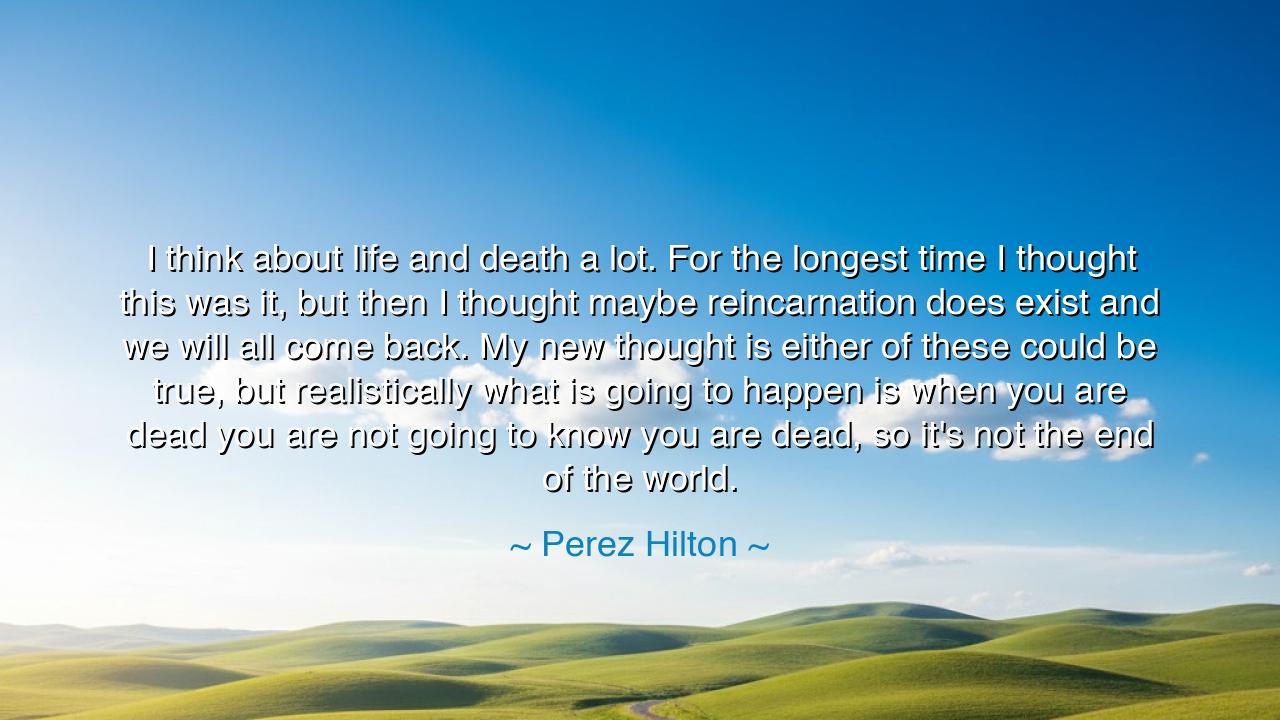
I think about life and death a lot. For the longest time I
I think about life and death a lot. For the longest time I thought this was it, but then I thought maybe reincarnation does exist and we will all come back. My new thought is either of these could be true, but realistically what is going to happen is when you are dead you are not going to know you are dead, so it's not the end of the world.






“I think about life and death a lot. For the longest time I thought this was it, but then I thought maybe reincarnation does exist and we will all come back. My new thought is either of these could be true, but realistically what is going to happen is when you are dead you are not going to know you are dead, so it's not the end of the world.” — Perez Hilton
In these words dwells a quiet contemplation of life and death, a meditation upon the vast mystery that has stirred the hearts of humankind since the dawn of time. The speaker journeys through the labyrinth of thought that every soul must one day traverse — the fear of ending, the hope of continuation, and the acceptance of uncertainty. It is not the declaration of a philosopher seated in marble halls, but the humble truth of a mortal who dares to gaze upon the infinite and not look away. Perez Hilton, though known first for the noise of modern life, here becomes a seeker of ancient wisdom — one who has stared into the void and found, not despair, but calm.
To ponder death is to wrestle with one’s own existence. Many have feared it, worshiped it, denied it — yet it is the one companion who never leaves us. Hilton’s reflection begins where all human thought begins: in doubt. He wonders if this single life is all there is. Then he turns his mind toward reincarnation, that ancient dream of souls returning in new forms, taught by sages of the East and echoed by mystics of every age. But finally, he arrives at a third revelation — that perhaps the truth lies not in what happens after, but in the peace of knowing that when the end comes, we will not even know it. The storm will pass, and consciousness will rest in stillness.
This thought is not one of despair, but of acceptance — the kind of acceptance the Stoics spoke of when they urged mortals to greet fate as a friend. In the ancient world, Marcus Aurelius himself, emperor and philosopher, wrote: “Do not fear death. It comes to us all, as it came to those before, and will come to those after.” He too saw that fear of death steals from us the joy of life. To understand that death is natural — and that when it arrives, we shall no longer feel fear, pain, or longing — is to be liberated. The quote thus speaks the language of timeless wisdom: that life is precious not because it lasts forever, but because it ends.
Consider the tale of Socrates, who, when condemned to drink the poison hemlock, spoke calmly to his grieving friends. They feared for his soul, but he said, “Either death is a dreamless sleep, or it is the journey of the soul to another world.” In both cases, he said, there is nothing to fear. He drank the cup in peace, certain that whatever awaited him was neither torment nor loss. In Hilton’s words, we hear this same echo — the voice of a man who has realized that death is not the end of the world, for when it comes, the world and self dissolve together, and there is no sorrow left to feel.
There is a strange comfort in this truth. For all our striving, our loves, and our griefs, we are part of a great rhythm — the rise and fall of existence itself. The awareness of mortality is not meant to cast us into darkness, but to teach us how to live. When one accepts that they will one day know nothing, they begin to value everything. Every breath becomes a treasure, every sunrise a miracle, every human touch a fleeting gift from eternity.
The lesson is clear: do not live in fear of death, but in reverence for life. We must not waste our days in dread of what cannot be avoided. Instead, we must fill them with meaning, compassion, and courage. Speak your truth. Forgive those who have wronged you. Create beauty. Love deeply, even knowing all things end. When you do this, you have already conquered death, for your spirit will have lived fully in the time it was given.
Thus, the ancient teaching reborn in modern words is this: accept the unknowable. Do not demand certainty from the cosmos, but find serenity in the mystery. When the end arrives, you will not know you are gone — so while you are here, know that you are alive. Let this wisdom be the torch that guides you, so that when your final dawn comes, you may meet it not with fear, but with the quiet joy of one who has truly lived.






AAdministratorAdministrator
Welcome, honored guests. Please leave a comment, we will respond soon